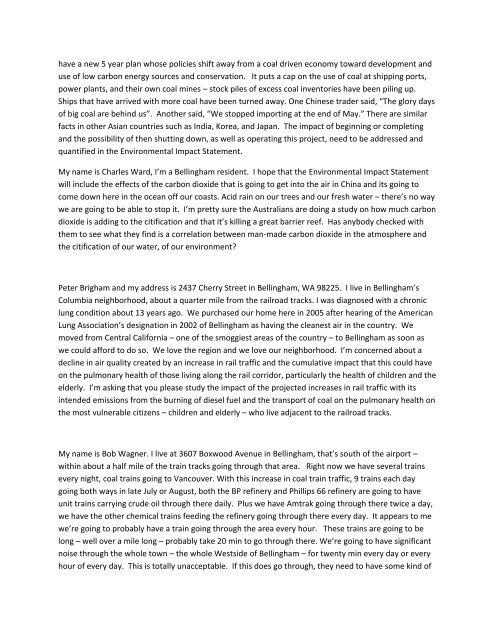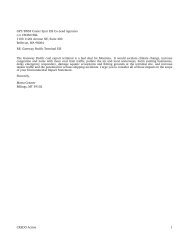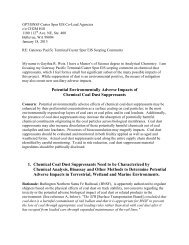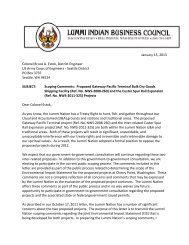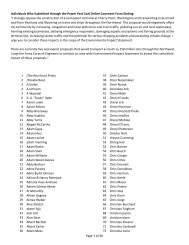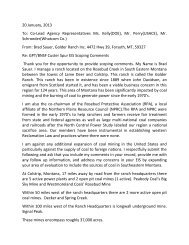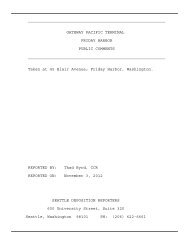Bellingham Comments from Digital Recorder - EISs for the Proposed ...
Bellingham Comments from Digital Recorder - EISs for the Proposed ...
Bellingham Comments from Digital Recorder - EISs for the Proposed ...
Create successful ePaper yourself
Turn your PDF publications into a flip-book with our unique Google optimized e-Paper software.
have a new 5 year plan whose policies shift away <strong>from</strong> a coal driven economy toward development and<br />
use of low carbon energy sources and conservation. It puts a cap on <strong>the</strong> use of coal at shipping ports,<br />
power plants, and <strong>the</strong>ir own coal mines – stock piles of excess coal inventories have been piling up.<br />
Ships that have arrived with more coal have been turned away. One Chinese trader said, “The glory days<br />
of big coal are behind us”. Ano<strong>the</strong>r said, “We stopped importing at <strong>the</strong> end of May.” There are similar<br />
facts in o<strong>the</strong>r Asian countries such as India, Korea, and Japan. The impact of beginning or completing<br />
and <strong>the</strong> possibility of <strong>the</strong>n shutting down, as well as operating this project, need to be addressed and<br />
quantified in <strong>the</strong> Environmental Impact Statement.<br />
My name is Charles Ward, I’m a <strong>Bellingham</strong> resident. I hope that <strong>the</strong> Environmental Impact Statement<br />
will include <strong>the</strong> effects of <strong>the</strong> carbon dioxide that is going to get into <strong>the</strong> air in China and its going to<br />
come down here in <strong>the</strong> ocean off our coasts. Acid rain on our trees and our fresh water – <strong>the</strong>re’s no way<br />
we are going to be able to stop it. I’m pretty sure <strong>the</strong> Australians are doing a study on how much carbon<br />
dioxide is adding to <strong>the</strong> citification and that it’s killing a great barrier reef. Has anybody checked with<br />
<strong>the</strong>m to see what <strong>the</strong>y find is a correlation between man-made carbon dioxide in <strong>the</strong> atmosphere and<br />
<strong>the</strong> citification of our water, of our environment?<br />
Peter Brigham and my address is 2437 Cherry Street in <strong>Bellingham</strong>, WA 98225. I live in <strong>Bellingham</strong>’s<br />
Columbia neighborhood, about a quarter mile <strong>from</strong> <strong>the</strong> railroad tracks. I was diagnosed with a chronic<br />
lung condition about 13 years ago. We purchased our home here in 2005 after hearing of <strong>the</strong> American<br />
Lung Association’s designation in 2002 of <strong>Bellingham</strong> as having <strong>the</strong> cleanest air in <strong>the</strong> country. We<br />
moved <strong>from</strong> Central Cali<strong>for</strong>nia – one of <strong>the</strong> smoggiest areas of <strong>the</strong> country – to <strong>Bellingham</strong> as soon as<br />
we could af<strong>for</strong>d to do so. We love <strong>the</strong> region and we love our neighborhood. I’m concerned about a<br />
decline in air quality created by an increase in rail traffic and <strong>the</strong> cumulative impact that this could have<br />
on <strong>the</strong> pulmonary health of those living along <strong>the</strong> rail corridor, particularly <strong>the</strong> health of children and <strong>the</strong><br />
elderly. I’m asking that you please study <strong>the</strong> impact of <strong>the</strong> projected increases in rail traffic with its<br />
intended emissions <strong>from</strong> <strong>the</strong> burning of diesel fuel and <strong>the</strong> transport of coal on <strong>the</strong> pulmonary health on<br />
<strong>the</strong> most vulnerable citizens – children and elderly – who live adjacent to <strong>the</strong> railroad tracks.<br />
My name is Bob Wagner. I live at 3607 Boxwood Avenue in <strong>Bellingham</strong>, that’s south of <strong>the</strong> airport –<br />
within about a half mile of <strong>the</strong> train tracks going through that area. Right now we have several trains<br />
every night, coal trains going to Vancouver. With this increase in coal train traffic, 9 trains each day<br />
going both ways in late July or August, both <strong>the</strong> BP refinery and Phillips 66 refinery are going to have<br />
unit trains carrying crude oil through <strong>the</strong>re daily. Plus we have Amtrak going through <strong>the</strong>re twice a day,<br />
we have <strong>the</strong> o<strong>the</strong>r chemical trains feeding <strong>the</strong> refinery going through <strong>the</strong>re every day. It appears to me<br />
we’re going to probably have a train going through <strong>the</strong> area every hour. These trains are going to be<br />
long – well over a mile long – probably take 20 min to go through <strong>the</strong>re. We’re going to have significant<br />
noise through <strong>the</strong> whole town – <strong>the</strong> whole Westside of <strong>Bellingham</strong> – <strong>for</strong> twenty min every day or every<br />
hour of every day. This is totally unacceptable. If this does go through, <strong>the</strong>y need to have some kind of


